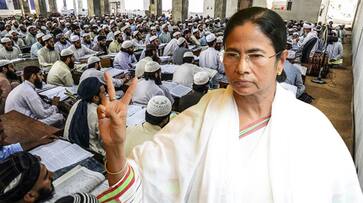
27-Jun-2024 , Updated on 8/29/2025 5:08:32 AM
Bengal Chief Minister Mamata Banerjee's love for Muslims and Hate for Hindus. Why?
Mamata Banerjee, the Chief Minister of West Bengal, is often criticized for showing favoritism towards Muslims while neglecting or even hating Hindus. This bias has led to growing anger among Hindus in the state and raises serious questions about her motives and the effects of her policies.
Banerjee seems to be playing a game of appeasement politics, openly pandering to Muslim voters to secure their support. Muslims make up a large part of the state's population, and her actions seem aimed at keeping them happy. Her administration has been accused of giving unfair benefits to Muslims, like more funding for madrasas, stipends for imams, and prioritizing development projects in Muslim-majority areas. Recently, her government decided to allocate 5000 crore INR for madrasas, which further shows this bias. These actions make Hindus feel ignored and alienated.
The clearest example of Banerjee’s bias is her response to communal violence. During Hindu-Muslim clashes, her government often turns a blind eye to the suffering of Hindus, downplaying the severity of attacks on them. In contrast, any incident involving Muslims gets swift action and public condemnation, creating a perception of unequal treatment under her rule.
Banerjee’s strategy seems driven by a desire to stay in power. By securing Muslim votes through appeasement and fostering a narrative of victimhood, she ensures their loyalty. This approach has dangerous consequences. It deepens communal divides and undermines the secular fabric of the state. Her policies risk fostering resentment and creating a volatile environment where religious tensions could easily escalate.
Moreover, Banerjee's approach has led to a backlash from the Hindu community, which feels increasingly marginalized. The rising support for opposition parties, which promise to address Hindu concerns, is a direct consequence of her polarizing policies. This growing polarization threatens the social harmony of West Bengal, a state historically known for its cultural inclusiveness and tolerance.
Critics argue that Banerjee’s favoritism towards Muslims is not just a political strategy but also a reflection of her personal beliefs. Her participation in Islamic religious events, like wearing hijabs and reciting Quranic verses, while avoiding similar Hindu events, sends a strong message about her priorities. Such actions, while seemingly symbolic, contribute to the perception of a leader who is more interested in catering to one community at the expense of another.
Another concerning aspect of her strategy is her use of the Rohingya refugee crisis to boost her vote bank. Banerjee has been accused of ignoring the illegal settlement of Rohingya Muslims in the state, which strains local resources and poses a potential security risk. By allegedly using Rohingya votes to her advantage, she risks the safety and stability of the region, prioritizing political gains over national security.
Mamata Banerjee’s apparent love for Muslims and neglect of Hindus is a troubling aspect of her time as Chief Minister. Her policies, driven by a mix of political expediency and personal bias, threaten the social fabric of West Bengal. Leaders must rise above communal politics and work towards inclusive development that benefits all communities equally. Only then can true harmony and progress be achieved in the state.

Student
I am a content writter !
Comments
Join Our Newsletter
Subscribe to our newsletter to receive emails about new views posts, releases and updates.
Copyright 2010 - 2026 MindStick Software Pvt. Ltd. All Rights Reserved Privacy Policy | Terms & Conditions | Cookie Policy